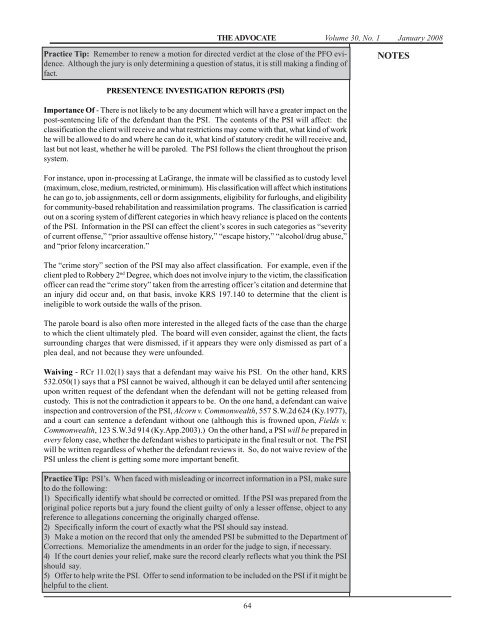Jan08 Advo.pmd - e-archives Home
Jan08 Advo.pmd - e-archives Home
Jan08 Advo.pmd - e-archives Home
Create successful ePaper yourself
Turn your PDF publications into a flip-book with our unique Google optimized e-Paper software.
THE ADVOCATE Volume 30, No. 1 January 2008<br />
Practice Tip: Remember to renew a motion for directed verdict at the close of the PFO evidence.<br />
Although the jury is only determining a question of status, it is still making a finding of<br />
fact.<br />
PRESENTENCE INVESTIGATION REPORTS (PSI)<br />
Importance Of - There is not likely to be any document which will have a greater impact on the<br />
post-sentencing life of the defendant than the PSI. The contents of the PSI will affect: the<br />
classification the client will receive and what restrictions may come with that, what kind of work<br />
he will be allowed to do and where he can do it, what kind of statutory credit he will receive and,<br />
last but not least, whether he will be paroled. The PSI follows the client throughout the prison<br />
system.<br />
For instance, upon in-processing at LaGrange, the inmate will be classified as to custody level<br />
(maximum, close, medium, restricted, or minimum). His classification will affect which institutions<br />
he can go to, job assignments, cell or dorm assignments, eligibility for furloughs, and eligibility<br />
for community-based rehabilitation and reassimilation programs. The classification is carried<br />
out on a scoring system of different categories in which heavy reliance is placed on the contents<br />
of the PSI. Information in the PSI can effect the client’s scores in such categories as “severity<br />
of current offense,” “prior assaultive offense history,” “escape history,” “alcohol/drug abuse,”<br />
and “prior felony incarceration.”<br />
The “crime story” section of the PSI may also affect classification. For example, even if the<br />
client pled to Robbery 2 nd Degree, which does not involve injury to the victim, the classification<br />
officer can read the “crime story” taken from the arresting officer’s citation and determine that<br />
an injury did occur and, on that basis, invoke KRS 197.140 to determine that the client is<br />
ineligible to work outside the walls of the prison.<br />
The parole board is also often more interested in the alleged facts of the case than the charge<br />
to which the client ultimately pled. The board will even consider, against the client, the facts<br />
surrounding charges that were dismissed, if it appears they were only dismissed as part of a<br />
plea deal, and not because they were unfounded.<br />
Waiving - RCr 11.02(1) says that a defendant may waive his PSI. On the other hand, KRS<br />
532.050(1) says that a PSI cannot be waived, although it can be delayed until after sentencing<br />
upon written request of the defendant when the defendant will not be getting released from<br />
custody. This is not the contradiction it appears to be. On the one hand, a defendant can waive<br />
inspection and controversion of the PSI, Alcorn v. Commonwealth, 557 S.W.2d 624 (Ky.1977),<br />
and a court can sentence a defendant without one (although this is frowned upon, Fields v.<br />
Commonwealth, 123 S.W.3d 914 (Ky.App.2003).) On the other hand, a PSI will be prepared in<br />
every felony case, whether the defendant wishes to participate in the final result or not. The PSI<br />
will be written regardless of whether the defendant reviews it. So, do not waive review of the<br />
PSI unless the client is getting some more important benefit.<br />
Practice Tip: PSI’s. When faced with misleading or incorrect information in a PSI, make sure<br />
to do the following:<br />
1) Specifically identify what should be corrected or omitted. If the PSI was prepared from the<br />
original police reports but a jury found the client guilty of only a lesser offense, object to any<br />
reference to allegations concerning the originally charged offense.<br />
2) Specifically inform the court of exactly what the PSI should say instead.<br />
3) Make a motion on the record that only the amended PSI be submitted to the Department of<br />
Corrections. Memorialize the amendments in an order for the judge to sign, if necessary.<br />
4) If the court denies your relief, make sure the record clearly reflects what you think the PSI<br />
should say.<br />
5) Offer to help write the PSI. Offer to send information to be included on the PSI if it might be<br />
helpful to the client.<br />
64<br />
NOTES













